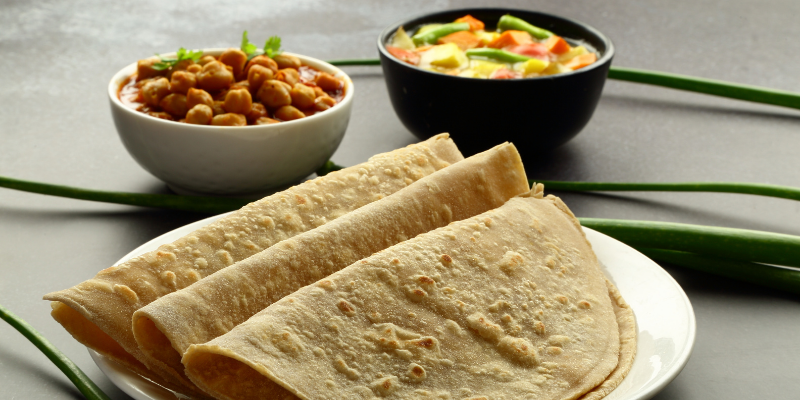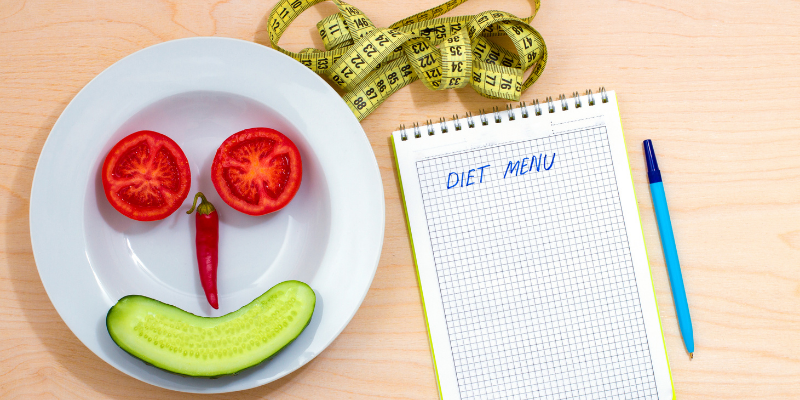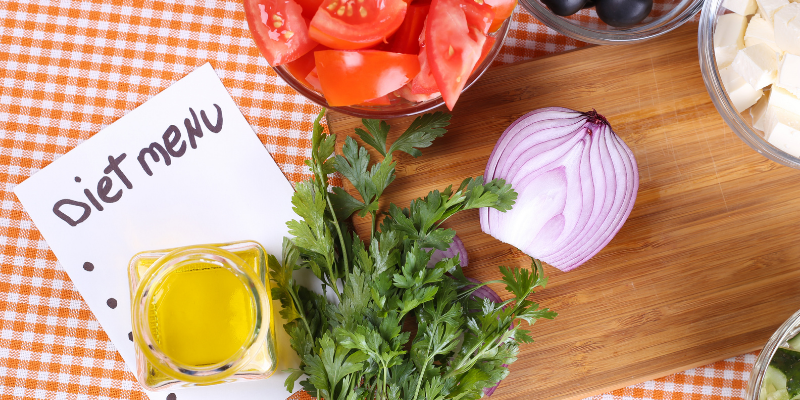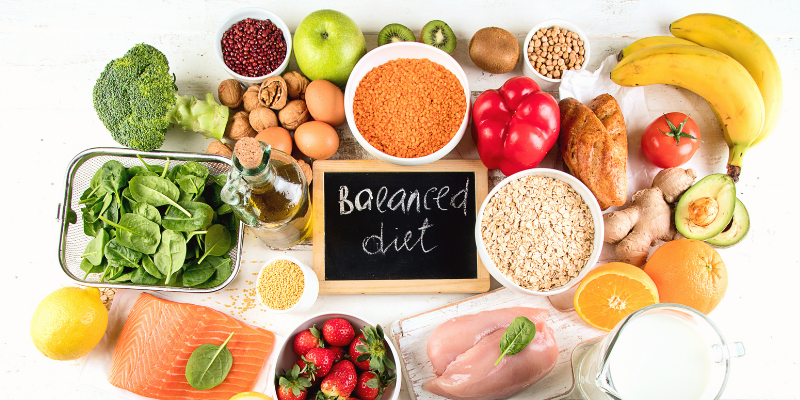Free Online Diet Plan for Weight Loss India
Are you tired of trying different diets to lose or maintain your weight? Why is sticking to a diet plan so tedious? If you are looking for an effective and sustainable weight loss solution, you are on the right page. Go ahead and check out the 7-Day Indian diet plan that top nutritionists recommend to enjoy the best results of weight management.
Is The Indian Diet Healthy?
Indian diet is not only well-balanced but also packed with several health benefits. However, several studies on the Indian diet report that it is protein-deficient and loaded with carbohydrates and starch. Does that mean the Indian diet is unhealthy? The answer is simple—NO!
The wide variety of food groups that make up our diet, including spices and herbs, makes it one of the most wholesome diets globally. Indian traditional foods have various functional components such as body-healing chemicals, antioxidants, dietary fibres, and probiotics. Hence, our standard diet can assist in weight loss, blood sugar control, and immune system support.
Must Read: Non-Surgical Weight Management Solution
What I s A S uitable D iet P lan F or Indians?
Have you ever wondered why sticking to a diet plan is so challenging sometimes? Is it because the shopping list gets extensive whenever we introduce new items to a diet plan? So, how can one make sustainable changes to their diet? Simple! Go for a traditional Indian diet instead of exotic ingredients or fad diets.
Our traditional cooking methods for preparing Indian foods, like sprouting, malting, and fermentation, boost its functional properties. Hence, the most suitable diet for Indians is a meal traditionally cooked with local and seasonal produce.
Must Read: Healthy Meal Plan For Weight Loss: Selection Tips
Top Benefits Of Following A n Indian D iet P lan
Famous for its abundance of spices, the Indian diet offers a wide range of flavours and colours that distinguishes it from other cuisines. Let us look at the unique benefits an Indian diet plan provides:
- Turmeric is an essential ingredient used in Indian recipes that reduces heartburn, bloating, arthritis, and Alzheimer's disease.
- Spices like cardamom may improve the functioning of the gut and intestine.
- Used as an integral part of Indian cooking—ginger, garlic, and chillies are all good for the heart and promote a robust immune system.
Finally, the wide variety of flavours and colours of the Indian diet keep it exciting and full of options, which lets you experiment with recipes to pamper your palate and prevent boredom.
7- Day I ndian D iet P lan F or Weight L oss

In all honesty, not all aspects of any cuisine are healthy, and it's a fact we all know. Hence, it would be best to stick to the healthier options it offers. For a successful weight-loss program, you should be conscious of what you consume daily—eating mindfully and paying keen attention to what, how, and where you eat can make a difference.
Calorie calculation is relatively straightforward with the availability of multiple apps today. A 1,400-calorie diet can also be one kachori, two samosas, two gulab jamun, and two cups of tea. While that doesn't sound so bad, there are no shortcuts for losing weight the healthy way. Following a balanced diet is vital is a must.
Let us check out what a healthy 7-day Indian diet plan for weight loss includes.
Healthy Indian Diet Chart For Females (1,200Kcal):

Here is a sample Indian diet chart for a healthy woman. Please note that these are standard recommendations, and you must consult a professional nutritionist before following them as they may not be suitable for you based on your health conditions, nutrient requirement, lifestyle habits, weight loss goals, and taste preferences.
Day 1:
- Early Morning
1 cup warm water with cinnamon - Breakfast
1 cup oats porridge with skimmed milk and walnuts (6 halves) - Mid-Morning
1 cup steamed green peas and carrot salad - Lunch
1 cup thick methi/palak dal + ¾ th cup steamed rice - Tea Time
1 guava - Mid-Evening
1 cup hung curd, apple, chia seeds smoothie/plain lassi - Dinner
3/4th cup cottage cheese (paneer) and Dalia/millets pulav
Day 2:
- Early Morning
1/2 cup masala tea/coffee without sugar - Breakfast
1/2 cup veg dalia/millets upma+ ¼ th cup sautéed cottage cheese (paneer) - Mid-Morning
1 apple, medium+ walnut 8 halves - Lunch
1/2 cup peas (matar) and cottage cheese (paneer) curry+ 1 roti 6″ (No oil/no ghee) - Tea Time
1/2 cup masala tea/coffee without sugar - Mid-Evening
1 cup hung curd apple, chia seeds smoothie/plain lassi - Dinner
2 cheela/dal dosa with tomato, ginger chutney
Day 3:
- Early Morning
1/2 cup milk with turmeric powder (haldi) and pepper powder (No added sugar) - Breakfast
2 pcs idli with 1/2 bowl sambar - Mid-Morning
1 cup pomegranate, walnut, sprouts salad - Lunch
1 cup peas (matar) dalia pulao - Tea Time
1 cup hung curd, apple, chia seeds smoothie/plain lassi - Mid-Evening
¼ cup sautéed cottage cheese (paneer) with veg - Dinner
1 cup masala oats and 1 cup vegetable soup
Day 4:
- Early Morning
1/2 cup milk with turmeric powder (haldi) and pepper powder (No added sugar) - Breakfast
2 egg white omelet with grated vegetables - Mid-Morning
Apple with boiled peas and walnuts salad - Lunch
1 palak/methi paratha with raita (1 cup) - Tea Time
Ginger lemon water with 1 tbsp chia seeds (No added sugar)/Green tea - Mid-Evening
1 cup tomato soup - Dinner
3/4th cup masala Oats/Dalia + 200g grilled fish
Day 5:
- Early Morning
1/2 cup milk with turmeric powder (Haldi) and pepper powder (No added sugar) - Breakfast
1 cup masala oats and walnuts (8 halves) - Mid-Morning
1 cup chickpea (chana) chaat - Lunch
1 cup pulav (Millets/Dalia with vegetables, boiled peas, and cottage cheese (peas) - Tea Time
1/2 cup masala tea/coffee without sugar - Mid-Evening
1 cup apple, curd, chia seeds smoothie - Dinner
1 chapati (no oil) with 3/4th cup any vegetables (no roots and tuber)
Day 6:
- Early Morning
1/2 cup masala tea/coffee without sugar - Breakfast
3/4th cup poha with vegetables and 1/4th lime wedge and 1 boiled egg white - Mid-Morning
1 orange + walnut (8 halves) - Lunch
1 cup Millets/ Dalia pulao with vegetables+ 1 small sliced tomato - Tea Time
1 cup buttermilk with cumin (jeera) powder and chia seeds - Mid-Evening
3/4th cup sprouts chaat with onion tomatoes and chaat masala - Dinner
200g chicken sautéed with boiled vegetables and pepper
Day 7:
- Early Morning
1/2 cup masala tea without sugar - Breakfast
2 moong cheela (5″ each) with tomato, ginger Chutney - Mid-Morning
1 cup pomegranate and carrot salad - Lunch
2 phulka (No oil/ no butter/no ghee) with 100g low-fat chicken curry (4 medium pcs) - Tea Time
1/2 cup masala tea/coffee without sugar - Mid-Evening
1 cup apple, curd, chia seeds smoothie - Dinner
1 cup fried rice with Quinoa/ Dalia, Egg, and 100gm Chicken
A Balanced Indian Diet Chart For Male (1,400 Kcal):

Here is a standard diet chart comprising Indian foods for a healthy man. It is advisable that you consult a professional nutritionist before adopting it as it may not be apt for you based on your underlying health concerns, nutrient requirement, food habits, targeted weight loss, and lifestyle.
Day-1
- Early Morning
1 cup warm water with cinnamon - Breakfast
1 cup oats porridge with skimmed milk and walnuts (6 halves) - Mid-Morning
1 cup steamed green peas and carrot salad - Lunch
1 cup thick methi dal + 1 cup steamed rice - Tea Time
1 guava - Mid-Evening
1 cup hung curd, apple, chia seeds smoothie/plain lassi - Dinner
1 cup cottage cheese (paneer) and dalia/millets pulav
Day-2
- Early Morning
1/2 cup masala tea/coffee without sugar - Breakfast
3/4th cup veg dalia/millets upma+ ¼th cup sautéed cottage cheese (paneer) - Mid-Morning
1 apple, medium+ walnut 8 halves - Lunch
1/2 cup peas (matar) and cottage cheese (paneer) curry+ 2 roti 6″ (no oil/no ghee) - Tea Time
1/2 cup masala tea/coffee without sugar - Mid-Evening
1 cup hung curd, apple, chia seeds smoothie/plain lassi - Dinner
2 cheela with tomato, ginger chutney
Day-3
- Early Morning
1/2 cup milk with turmeric powder (haldi) and pepper powder (No added sugar) - Breakfast
3 pcs idli with 1/2 bowl sambar - Mid-Morning
1 cup pomegranate, walnut, sprouts salad - Lunch
1 and a 1/2 cup peas (matar) and dalia pulav - Tea Time
1 cup hung curd, apple, chia seeds smoothie/plain lassi - Mid-Evening
¼ cup sautéed cottage cheese (paneer) with veg - Dinner
1 and a 1/2 cup masala oats and 1 cup vegetable soup
Day-4
- Early Morning
1/2 cup milk with turmeric powder (haldi) and pepper powder (No added sugar) - Breakfast
2 egg white omelette with grated vegetables - Mid-Morning
Apple with boiled peas and walnuts salad - Lunch
2 palak paratha with raita (1 cup) - Tea Time
Ginger lemon water with 1 tbsp chia seeds (No added sugar)/green tea - Mid-Evening
1 cup tomato soup - Dinner
1 cup masala oats/dalia + 200g grilled fish
Day-5
- Early Morning
1/2 cup milk with turmeric powder (haldi) and pepper powder (No added sugar) - Breakfast
1 cup masala oats and walnuts (8 halves) - Mid-Morning
1 cup chickpea (chana) chaat - Lunch
1 cup pulao (millets/dalia with vegetables, boiled peas and cottage cheese (paneer) - Tea Time
1/2 cup masala tea/coffee without sugar - Mid-Evening
1 cup apple, curd, chia seeds smoothie - Dinner
2 chapati (no oil) with 3/4th cup of any vegetables (no roots and tuber)
Day-6
- Early Morning
1/2 cup masala tea/coffee without sugar - Breakfast
1 cup poha with vegetable and 1/4th lime wedge and 1 boiled egg white - Mid-Morning
1 orange + walnut (8 halves) - Lunch
1 and a 1/2 cup millets/ dalia pulao with vegetables+ 1 small sliced tomato - Tea Time
1 cup buttermilk with cumin (jeera) powder and chia seeds - Mid-Evening
1 cup sprouts chaat with onion tomatoes and chaat masala - Dinner
200 g chicken sautéed with boiled vegetables and pepper
Day-7
- Early Morning
1/2 cup masala tea without sugar - Breakfast
2 moong cheela (5″ each) with tomato and ginger chutney - Mid-Morning
1 cup pomegranate and carrot salad - Lunch
3 phulka (no oil/no butter/no ghee) with 100g low-fat chicken curry (4 medium pcs) - Tea Time
1/2 cup masala tea/coffee without sugar - Mid-Evening
1 cup apple, curd, chia seeds smoothie - Dinner
1 and a 1/2 cup fried rice with quinoa/ dalia, egg and 100gm chicken
Must Read: Effective Indian Diet Plan To Lose 5kg in 2 Weeks
What Foods T o Avoid For Weight L oss?
Losing weight can be a considerable challenge—even more so when you lack the willpower to stick to a healthy diet. Some food categories are very high in sugars and fats and can lead to unnecessary weight gain. For a successful weight loss journey, stay away from the following unhealthy food choices:
- Sugary beverages/colas/sodas/packaged juices/energy drinks
- Bakery items like cakes and biscuits
- Refined foods like pasta and bread
- Fried food
- Fatty/processed red meat
- Alcohol
- Restaurant foods with high trans fats
- Chocolates/candies/energy bars
- Breakfast cereals
- Crackers and chips
Tips F or Maintaining A Balanced D iet

Here are some simple tips to follow a nutritious diet while pampering your tastebuds healthily too:
- A simple rule to follow is to make sure half your plate is full of fruits and vegetables.
- Ensure 50 percent of the grains you consume are whole grains to increase your fiber intake.
- Consume low-fat or skimmed milk instead of whole-fat dairy.
- Choose lean meats like chicken and fish instead of red meats.
- Increase your water intake and cut down your consumption of sugary beverages.
- Control your portion sizes. You can try using smaller plates. Serve your entire meal before starting to avoid taking more helpings.
- No effort is futile. Even borderline weight loss of just 5 to 10 percent of your total body weight will regulate your cholesterol, blood pressure, and blood sugar levels.
- Do not fall prey to marketing gimmicks and indulge in low-fat products. A few brands tend to add excess sugar to compensate for fats to make the food more palatable. Researchers have suggested that people eat 30 percent more when they know that what they are eating is low fat.
- Always choose freshly cooked meals over tinned or frozen foods.
- If you crave those occasional cheat meals, remember that you have to either reduce your ENERGY IN or increase your ENERGY OUT on consecutive days to maintain healthy body weight. Remember, consuming even 150 calories extra can lead to two kilos' weight gain over six months.
- Make wiser choices when you're dining out. Choose steamed, boiled, baked, roasted, poached or lightly sautéed food over fried and calorie-dense food.
- Do not start a very low-calorie diet of fewer than 800 calories per day unless your nutritionist advises you.
With drastic and sudden changes to your eating pattern, you may achieve short-term goals, but they won't be long-lasting. Instead, what you can do is :
- Review your eating habits and work on improving them.
- Replace your unhealthy eating options with healthier choices.
- Reinforce your newly-adopted healthier eating habits.
Now let us now find out what leading nutritionists have to say.
What Diet Do Top Nutritionists Recommend?

The process of healthy weight loss is not about following different crash diets. It is about modifying your lifestyle in the long run to improve daily eating and exercise habits. A diet based on staples and traditional foods is healthy, sustainable, and quickly adaptable.
Plan your meals—because it is an easy way to help you reach your goals—whether you are trying to lose weight or improve your fitness levels. Following a diet plan can slim your waistline and improve your overall health parameters.
A large study on more than 14,000 individuals concluded that users who frequently track activities tend to lose more weight. Meanwhile, another review study suggested a strong association between weight loss and the frequency of monitoring food intake and exercise. Hence, plan your meals to make a weekly meal chart full of healthy options. Stock up healthy ingredients in advance and control portion sizes, save time and money and minimize food wastage.
Must Read: Exercise & Weight Loss: Surprising Myths & Facts!
Lastly, the human body requires variety and constant change. Indian diet is a solid combination of various grains, lentils, vegetables, fruits, spices, and herbs. Indian traditional health food choices are diverse based on climatic conditions, seasonal produce, and cultural preferences determined over a long period. In a nutshell, stick to what we know and what worked for us for so many generations.
Set realistic weight loss goals. Pursuing a balanced dietary plan tailored to match individual needs, preferences, and medical conditions is fundamental to facilitating healthy weight loss. Traditional Indian health foods are a goldmine comprising various choices. Make informed decisions, and you can enjoy the best Indian diet plan that ensures optimal yet sustainable weight management results.
For comprehensive and customized meal planning based on your health status, nutritional requirements, tastes and cultural preferences, baseline weight, and health goals, please visit Oliva Skin & Hair Clinic and get ready to enjoy sustainable weight loss results and long-lasting health benefits. Do not forget to like and share this article and spread the buzz to be part of the fitness revolution!
Free Online Diet Plan for Weight Loss India
Source: https://www.olivaclinic.com/blog/indian-diet-plan-weight-loss/